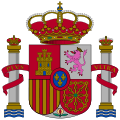- Cabinet of Spain
-
Spain 
This article is part of the series:
Politics and government of
SpainLegislature- Cortes Generales
- Congress of Deputies
- President
- Senate
- President
- Congress of Deputies
- Opposition Leader
- People's Defender
- Court of Accounts
- General Council of the Judiciary
- Supreme Court
- Audiencia Nacional
Divisions- Autonomous
communities- Reg. governments
- Reg. legislatures
- Provinces
- Comarcas
- Municipalities
Foreign policy
The Cabinet of Spain (also called the Council of Ministers, Spanish: Consejo de Ministros) is a collegiate body composed of the President of the Government (Prime Minister), Vice Presidents when existing and the Ministers, and any other member required by law, and in some cases Secretaries of State (Junior Ministers). It is regulated by Article 98 of the Spanish Constitution.
Contents
History
Origins
After the experience during the Trienio Liberal[1] the Council of Ministers was formally created by King Ferdinand VII, who ordered by Royal Decree of 19 November 1823 that his Secretaries of State (Secretarios de Estado y del Despacho) should gather to form a body, which was to be called Council of Ministers. In the meetings of this Council all matters of common interest would be discussed, and every Secretary would report about affairs under his responsibility and receive instructions from the King. The Secretary of State would act as Chief Minister and preside over the meetings when the King was absent.[2]
The Council of Ministers under the Constitutional Monarchy
The Council of Ministers during the Second Spanish Republic
The Council of Ministers during the Franco regime
The Council of Ministers in the Spanish Constitution of 1978
The Council of Ministers meets on weekly basis, usually Fridays in the morning at Moncloa Palace, but exceptionally, it may meet in any other city of Spain. The meetings are chaired by the Prime Minister, though, in his absence, Vice Presidents take the responsibility to chair over the cabinet. Also on exceptional occasions, the cabinet can be chaired by the King of Spain: inthen, the meeting is solely consultative.
See also
- List of cabinets
- Politics of Spain
Notes
References
- Villarroya, Joaquín Tomás (1986), Breve historia del constitucionalismo español, Madrid: Centro de Estudios Constitucionales, ISBN 84-259-0652-0.
External links
National cabinets of Europe Sovereign
states- Albania
- Andorra
- Armenia
- Austria
- Azerbaijan
- Belarus
- Belgium
- Bosnia and Herzegovina
- Bulgaria
- Croatia
- Cyprus
- Czech Republic
- Denmark
- Estonia
- Finland
- France
- Georgia
- Germany
- Greece
- Hungary
- Iceland
- Ireland
- Italy
- Kazakhstan
- Latvia
- Liechtenstein
- Lithuania
- Luxembourg
- Macedonia
- Malta
- Moldova
- Monaco
- Montenegro
- Netherlands
- Norway
- Poland
- Portugal
- Romania
- Russia
- San Marino
- Serbia
- Slovakia
- Slovenia
- Spain
- Sweden
- Switzerland
- Turkey
- Ukraine
- United Kingdom
- (England
- Northern Ireland
- Scotland
- Wales)
States with limited
recognition- Abkhazia
- Kosovo
- Nagorno-Karabakh
- Northern Cyprus
- South Ossetia
- Transnistria
Dependencies
and other territories- Åland
- Faroe Islands
- Gibraltar
- Guernsey
- Jan Mayen
- Jersey
- Isle of Man
- Svalbard
Other entities - European Union
 Cabinets of Spain since 1977Categories:
Cabinets of Spain since 1977Categories:- Government of Spain
- National cabinets
- Lists of government ministers of Spain
- Cortes Generales
Wikimedia Foundation. 2010.
